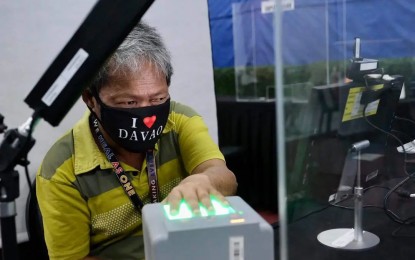
Philippine Identification System - Davao mall registration (File photo courtesy of City Government of Davao)
DAVAO CITY - The Philippine Statistics Authority (PSA) on Wednesday said printing signatures onto the national ID is among the security features that protect its holder from forgery, fraud, or identity theft.
The PSA issued the reiteration after several cardholders complained that some establishments have been refusing to honor their national IDs because they do not bear their handwritten signatures in them.
“Mas mataas ang tsansa ng pandaraya o panghuhuwad sa mga tradisyonal na proseso katulad ng paggamit ng paper forms, photocopy ng ID at handwritten signature (There is higher chance of fraud, falsification of traditional process like the use of paper forms, photocopy of ID and handwritten signature),” the PSA said.
The PSA said the Philippine Identification System (PhilSys) also employs a biometric system that allows cardholders who do not have or are incapable of providing handwritten signatures to get authenticated through their thumbmarks.
“This is considered by PhilSys that is why it provided online and offline methods for identity authentication like the PhilID physical security features including the QR code digital verification, biometric verification and SMS one-time password (OTP),” the PSA said.
The PSA expressed hope that service providers both in the government and private sector would soon adjust and adapt to the security features of the PhilID.
Signed into law by President Rodrigo R. Duterte in August 2018, Republic Act 11055, or the Philippine Identification System Act, aims to establish a single national ID for all Filipinos and resident aliens.
The national ID shall be a valid proof of identity that shall be a means of simplifying public and private transactions, enrollment in schools, and the opening of bank accounts.
It also seeks to boost efficiency, especially in dealing with government services where people will only need to present one ID during transactions. (PNA)
